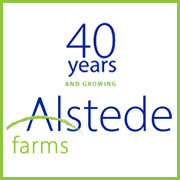40 years and growing
40 years and growing
We’re celebrating our 40th year of farming in Chester, NJ and are excited to share our humble roots with you. Farmer Kurt W. Alstede started farming on a couple acres of farmland located in Chester Township, NJ back in 1982. The farmland was originally owned by the Mennen family purchasing the land in the late… Read More »

Choosing to be a farmer was an epiphany moment for Farmer Kurt realized in 1982 when he was back in high school. He began his early career growing hay & grain. Being a first generation Farmer, Kurt had to have the self determination to seek out knowledgeable people in the farming industry and advanced his studies at Delaware Valley University specializing in plant sciences. This set him on his path and fueled his desire to be a farmer by trade where he began farming the property formerly known as Hideaway Farm, today known as Alstede Farms. From it’s inception, Alstede Farms was always a pioneer in the industry with a passion for sustainable and regenerative farming where Farmer Kurt won awards for his soil & water conservation efforts and became known for his innovative farming techniques. Today you will see advances in farming to include sustainable and regenerative practices such as; cover cropping for carbon sequestering, recycling water through a rain barrel system used for trickle irrigation of crops and zero waste agriculture implementation, where surplus food is donated, blemished food is repurposed and expired food is composted. Other techniques such as row cropping, no till farming and increasing crop diversity also aid in the overall sustainability mission.
The early origins of growing grain & hay turned into wholesaling vegetables and then in 2003 Farmer Kurt changed to an all retail model
This parcel of farmland is considered by some to be the most visible farm in Chester Township along with a significant farm in Morris County which has been permanently preserved by the Farmland Preservation Program. If this tract had not been preserved there certainly would be a different character to Chester and Morris County as the land would have been sold for homes. Preserving this land for farming ensures that this area retains it’s scenic green landscape and improves the overall quality of life for all in the region. This tract of land is the largest privately owned piece of private property in Chester Township and will remain that way through the preservation program allowing it to be open to visitors and guests for years to come. Preservation of this farm and opening it up to the public has also shaped the regions economic stability. Support through tourism repeats locally three times and regionally nine times.
We hope you enjoyed learning a little bit about our roots and thank you for your support of local agriculture.







